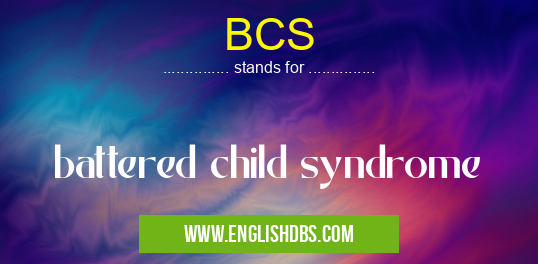What does BCS mean in BRITISH MEDICINE
BCS is a medical acronym used to describe the condition of a child who has sustained physical or emotional abuse. The term is typically used to refer to children aged 0-18 years old, although in rare cases, it may also be applied to those above 18 years of age. BCS can have both short and long-term effects on the mental and physical health of children, making it important for parents and medical professionals alike to understand and recognize the signs.

BCS meaning in British Medicine in Medical
BCS mostly used in an acronym British Medicine in Category Medical that means battered child syndrome
Shorthand: BCS,
Full Form: battered child syndrome
For more information of "battered child syndrome", see the section below.
Diagnosis & Treatment Options for BCS
BCS is a difficult condition to diagnose due to its insidious nature but a comprehensive assessment including medical testing and psychological evaluation is often necessary to confirm diagnosis. It is important for professionals diagnosing this condition that they take into account any environmental factors that could be contributing to the child’s mental state before making a diagnosis. Treatment options vary on a case-by-case basis but may involve medication management such as antidepressants as well as specialized therapy sessions designed specifically for children suffering from BCS. Parental education courses can also be helpful in helping parents learn how best support their child during this time.
Essential Questions and Answers on battered child syndrome in "MEDICAL»BRITMEDICAL"
What is Battered Child Syndrome?
Battered child syndrome is a medical term used to describe the physical and psychological wellbeing of a child who has been subjected to abuse, neglect, or both. It is often caused by repeated physical and emotional abuse at the hands of a parent or caregiver, which can manifest in both physical and psychological effects.
How long does battered child syndrome last?
The effects of battered child syndrome are long lasting. Depending on the severity of the trauma experienced by the child, effects may remain with them their whole life. If caught early, however, professional help can be sought to reduce the risk of long-term damage.
Are there any physical signs of battered child syndrome?
Yes, there are several physical signs that could indicate that a person has suffered from battered child syndrome in the past. These include frequent bruising in areas other than typical ‘play’ bruises; malnourishment; chronic fatigue; fearfulness; post-traumatic stress disorder (PTSD); and depression.
What causes battered child syndrome?
Battered Child Syndrome is usually caused by prolonged exposure to violent behavior perpetrated against a young person by an adult or older person within their circle. This can include physical violence such as beatings and emotional violence such as threats and intimidation.
How do you know if someone has been affected by BCS?
There are several tell-tale signs that could indicate that someone has been affected by BCS in their lifetime such as fearfulness; refusal to engage in activities they once enjoyed; difficulty forming relationships with others; avoidance of certain situations or people associated with past trauma; feeling isolated or scared when alone. Additionally, some individuals may be physically scarred due to injuries sustained during previous traumas.
Who should I turn to if I suspect someone I know is suffering from BCS?
If you suspect someone close to you may have suffered from BCS it’s important that you seek professional help for them immediately. It’s best not to investigate yourself but instead contact your local social services team who will be able provide support for you both if necessary.
Is it possible for battered child syndrome victims to recover fully?
Although it takes time, many victims of battered child syndrome do go on to lead full and successful lives with appropriate professional help and guidance from family members and friends. With ongoing support and lifestyle changes such as therapy sessions or mindfulness practices, individuals can learn new coping mechanisms which make recovery easier over time.
Are there support groups available for those living with BCS?
Yes, there are several organizations offering peer-to-peer support groups specifically for those living with battered child syndrome across the US and UK including SurvivorsUK in London and Mosaic Family Services in Texas - both offer one-on-one meetings where individuals can discuss their experiences anonymously and connect with others going through similar challenges in life.
What kind of help do I need if my childhood was affected by BCS?
If you feel like your childhood was affected by battered child syndrome then seeking professional help could be beneficial for your mental health in order to deal with any trauma experienced during this period effectively. Counselling sessions – either one-on-one or group therapy – are options available which could provide structured assistance throughout this process of recovery.
Final Words:
Battered Child Syndrome (BCS) is an unfortunate reality faced by too many children across the world. Recognizing this condition early is key in ensuring that these vulnerable members of our society receive the care they need and deserve. By understanding what BCS means and learning about how it impacts its victims we can help create a safe environment where all kids feel safe and secure regardless of their circumstances.
BCS also stands for: |
|
| All stands for BCS |
